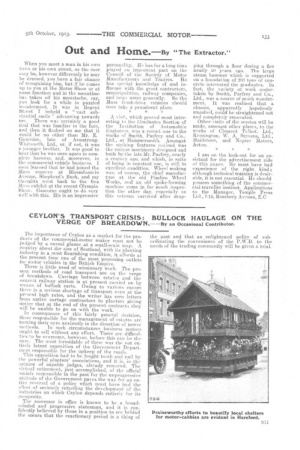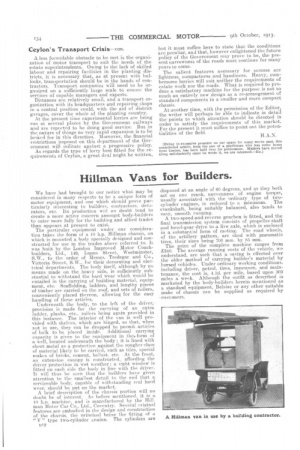CEYLON'S TRANSPORT CRISIS: BULLOCK HAULAGE ON THE VERGE OF BREAKDOWN.---By an Occasional Contributor.
Page 13

Page 14

If you've noticed an error in this article please click here to report it so we can fix it.
The importance of Ceylon as a market for the products of the commercial-motor maker must not be judged by a casual glance at a small-scale map. A country about the size of Scotland, with its planting industry in a most flourishing condition, it affords at the present tune one of the most promising outlets foe motor vehicles in the British Empire. There is little need of missionary work. The present methods of road transport are on the verge of breakdown. Carriage between estates and the nearest railway station is at present carried on by means of bullock carts. Owing to various causes there is a serious shortage of transport even at the present high rates, and the writer has seen letters Irons native cartage contractors to planters giving notice that at the end of the present contracts they will he unable to go on with the work. in consequence of this fairly general decision, those responsible for the management of estates are turning their eyes anxiously in the direction of newer
methods. In such circumstances business motors ought to sell without any effort. There are difficulties to be overcome, however, before this can be the ease. The most formidable of these was the not entirely latent opposition of the Government Departmentresponsible for the -upkeep of the roads.
This opposition had to be fought tooth and nail by the powerful planters' associations, and it is, in the opinion of capable judges,already removed. The virtual retirement, just accomplished, of the official mainly responsible in the past for the unprogressive attitude of the Government .paves the way for an entire reversal of a policy which must have had the effect, of seriously retarding the development of the industries on which. Ceylon depends entirely for its prosperity.
The successor in office is known to ben. broadinincled and progressive statesman, and it is confidently believed by those in a position to see behind the scenes that the reactionary period is a thing of
the past and that an enlightened policy of subordinating the convenience of the P.W.D. to the needs of the trading community will be given a trial. A less formidable obstacle to be met is the organization of motor transport to suit the needs of the estate superintendents. Owing to the lack of skilled labour and repairing facilities in the planting districts, it is necessary that, as at present with bullocks, transportation should be in the hands of contractors. Transport companies will need to be orgauized on a sufficiently large scale to ensure the services of capable managers and experts. Distances are relatively small, and a transport organization with its headquarters and repairing shops in a central position could, with the aid of district garages, cover the whole of the planting country. At the present time experimental lorries are being run at several places by the Government railways and are repected to be doing good service: But in the nature of things no very rapid expansion is to be looked for in this direction. Moreover, the financial restrictions imposed on this department of the Government will militate against a progressive policy. As regards the type of lorry best fitted for the requirements of Ceylon, a great deal might be written, but it must suffice here to state that the conditions are peculiar, and that, however enlightened the future policy of the Government may prove to be, the present narrowness of the roads must continue for many years to come.
The salient features necessary for success are lightness, compactness and handiness. Heavy, cumbersome lorries will suit neither the requirements of estate work nor the roads. What is required to produce a satisfactory machine for the purpose is not so much an entirely new design as a re-arrangement of standard components in a smaller and more compact chassis.
At another time, with the permission of the Editor, the writer will perhaps be able to indicate in detail the points to which attention should be directed in wader to satisfy the requirements of this market. For the present it must suffice to point out the potentialities of the field.
H.A.N.
[Owing to excessive pressure on our space for many weeks past, this contributed article, from the pen of a gentleman who has come home from Ceylon, has been held over for publication. Matters have moved along satisfactorily since he Wrote it, we are informed.—Eo.1




















